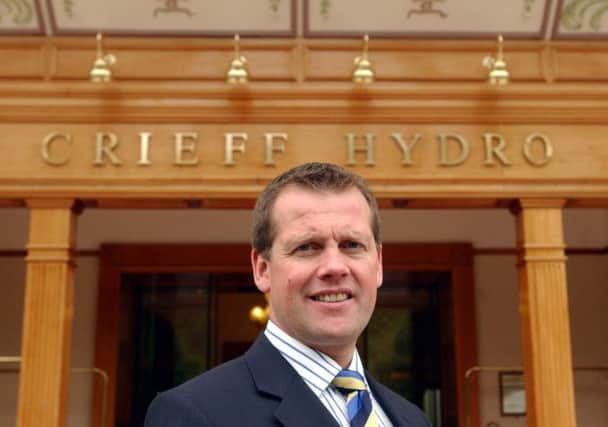SNP fails to make financial case for Yes - Leckie


Stephen Leckie, chair of the Scottish Tourism Alliance, said there was huge uncertainty for what independence would mean for his industry.
Mr Leckie, whose organisation has more than 250 members representing around 70 per cent of the industry, said many business owners were “punch-drunk” over the tone and nature of the debates over independence in recent months.
Advertisement
Hide AdAdvertisement
Hide AdAnd he suggested a majority of them were against Scotland going it alone because of the lack of financial details in the SNP’s independence White Paper and concerns over key issues like what currency they would be using in future.
Mr Leckie, who is also chief executive of Crieff Hydro, one of the country’s leading resort hotels, said there was a huge amount of concern from business owners who don’t have the option of relocating over the border.
The STA has been a vocal campaigner for a cut in VAT rates for tourism businesses - a move the Scottish Government has not yet committed to, although ministers have outlined plans in the independence White Paper to cut air passenger duty by 50 per cent to boost international connections to Scotland.
Tourism is one of Scotland’s biggest industries, worth more than £11 billion to the economy each year and supporting around 200,000 jobs. Mr Leckie’s views emerged during Scottish Tourism Week, which includes a two-day conference in Edinburgh.
The STA, which describes itself as the voice of the tourism industry in Scotland”, is joining forces with two other major bodies, the British Hospitality Association and the Hospitality Industry Trust Scotland, to stage a major debate on the issue in May in a bid to clear up unanswered questions.
Mr Leckie, who confirmed a buy-out of Peebles Hydro earlier this month, said: “The industry is continuing to ask one question on the issue - what are the financial implications of independence for Scotland? They just don’t know what they will be and it is a big concern for people.
“I hear from a lot of people that the White Paper is a very aspirational document.
“As a patriot of Scotland, it’s fantastic, it’s great, but show me the financials, show me the business case. All these debates can happen until the cows come home, but show me figures I can understand and believe. I’m hearing the same things time and time again from people and not just within the tourism industry.
Advertisement
Hide AdAdvertisement
Hide Ad“I don’t know how I’m going to vote yet, I haven’t decided. I actually think we have amazing leaders in Alex Salmond, Fergus Ewing and John Swinney.
“But the discussions and debates and arguments that are going on at the moment are, I think, not representing Scotland and the parliament well. All it is is everyone just arguing with each other.
“People are becoming punch-drunk. The same arguments are just going round and round in circles. The long and short of it is that we have just not seen a proper business case for independence. The feeling I get from speaking to people in the industry is that most of them are against independence at the moment.
“You hear all this talk stories about companies moving to England. We don’t have the option of doing that. We will make the best of it whatever it may be.
“We need to know what is happening with the pound and whether we are going to be using the Euro or not. We are dealing with agents who want to know what currency we will be dealing in two or three years from now. We just don’t know yet.
“There are other big-ticket items like what will be happening with pensions, North Sea oil and gas revenue, and the naval bases at Rosyth and Faslane, who are big investors and employers.”
Mr Ewing told The Scotsman: “I think the tourism industry is probably representative of society as a whole - people can see a great many positives.
“The fact is Scotland doesn’t exist as a state at the moment. We have heard at this conference that some people in places like America get Scotland confused in their minds with Ireland.
Advertisement
Hide AdAdvertisement
Hide Ad“In an independent country, the very first thing that happens is there is more visibility. The eyes of the world will be on Scotland.
“Businesses are not raising concerns with me. On the contrary, Willie Walsh (chief executive of BA’s parent company) and Michael O’Leary (chief executive of Ryanair) have welcomed the prospect of independence.
“Under independence, we will have the ability to decided our own tax rates. We have around the highest APD rates in the world in the UK at the moment. We recognise that VAT is a considerable burden for tourism businesses in Scotland.
“There will also be much more of a focus on tourism under independence, as it is of much more importance to Scotland than it is to Britain. More people per head work in tourism in Scotland than they do in England. It is certainly not as important at a political level down south.”
Marc Crothall, chief executive of the STA, told the conference yesterday: “Whatever the result of the independence referendum later this year Scottish tourism businesses should be able to benefit from a reduced rate of VAT, like 24 out of 28 EU countries already do.”
VisitScotland chairman Mike Cantlay said: “Businesses are not talking to me about the referendum. The total focus of the industry at the moment is the sheer scale of events that are on in 2014 and the opportunities that are there.”
SEE ALSO